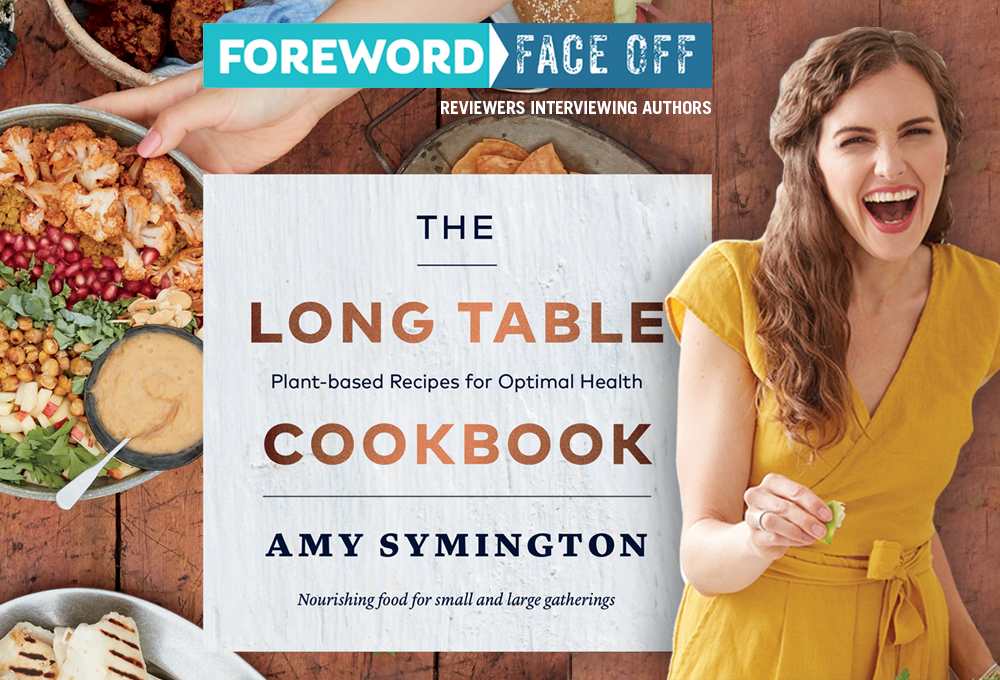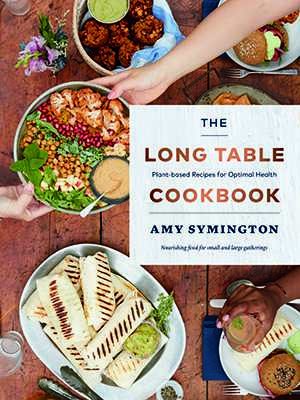Foreword Face Off-Reviewer Jessie Horness interviews Amy Symington, author of The Long Table Cookbook

Within every culture around the world, food is an integral pillar. Whether feasting, fasting, celebrating, or grieving, we all draw together around a table to share memories and build traditions with loved ones. Gathering for a meal fosters communication and community, nourishing the soul along with the body, and no one understands that better than Amy Symington, author of The Long Table Cookbook.

Through her work with a nonprofit cancer organization, Amy has seen firsthand the value of healthy group meals, allowing people to gain strength from and share joy with others, even when drawn together under difficult circumstances. With her emphasis on plant-based meals, Amy presents healthy recipes designed to feed large groups, sorting the recipes into categories to help you pull off everything from a holiday banquet to a summer potluck. Whether you’re looking for light, fresh salads capitalizing on seasonal ingredients or creamy Black and Blue Cashew Cheesecake, The Long Table Cookbook has something for every palate.
After reading Jessie Horness’s mouth-watering review in the latest issue of Foreword Reviews, we realized we had to go back for seconds, and worked with Douglas & McIntyre to set up an interview with Amy.
Serve it up, Jessie!
We’ve been loving your cookbook—the Roasted Tomato and Garlic Soup has become a household staple.
The Roasted Tomato and Garlic Soup my husband and I served at our wedding, so I would tend to agree with your enthusiasm about it!
Tell me a little more about the supper club that inspired The Long Table Cookbook. How did it start? What have you learned along the way? What keeps it sustainable?
The inspiration for The Long Table Cookbook came from the culinary nutrition programming that I run at a not-for-profit cancer organization I work for in Toronto, Canada, called Gilda’s Club Greater Toronto. I do nutrition workshops, culinary demonstrations, and run a supper club program for those who have been touched by cancer. This includes people who have been recently diagnosed with cancer, are currently in treatment or are recovering from treatment, as well as caretakers or family/friends of people who have cancer. For the supper club programming specifically, myself and my amazing team of volunteers provide a five-course meal to members twice a week. Originally the programming began as an aid in increasing attendance for the evening wellness group meetings to alleviate the stress of having to rush to cook and eat dinner before the meeting. Some eight years later it is now one of our most popular programs. We feed up to seventy-five people per week health-promoting, delicious comfort food in a welcoming communal setting. The idea that good food should not only provide nutrients, but if also eaten in a supportive group setting it will provide social and emotional support as well is the basis of the cookbook. Over the years I have learned that the power and health benefits of good food in good company can literally be life changing. As the organization is completely not-for-profit, our free community-based programming depends upon donations in order to run. This is why I am donating 100% of my author royalties to help fund the social, emotional, and nutritional work that we do there.
Whenever I proselytize the benefits of cultivating meaningful face-to-face relationships, I inevitably hear the argument that, while that sounds great, no one knows how to make friends as an adult. What would you say to folks who might want to start building the kind of connections you talk about in the book, but aren’t sure where to start?
Join a group or team or club or take a class that interests you! Or volunteer for something that you’re passionate about. You will meet like-minded people who share your values and interests and the conversations will flow from there!
Let’s say I want to invite a bunch of people over for dinner, but I’m not used to cooking for big groups. What are your tips for stress-free hosting for a crowd?
Pick some tried and true recipes that you love to make! One bowl or one pot or one dish recipes definitely alleviate some of the stress of cooking for larger groups too. Think big, easy salads, soups, stews, chowders, moussaka, baked pastas, etc. and then make-ahead desserts that you can freeze and thaw when needed—like any of the freezer-friendly desserts from my book for example. Once you have the menu set then prep in advance to help break down the cooking/baking load into manageable “bite-sized” pieces.
I love the joyfulness of the plant-based recipes in your book—big, beautiful, colorful pictures, plenty of rich, indulgent foods. Knowing that shifting habits, especially eating habits, is hard, are there any particular starting points you recommend for folks looking to integrate more plant-based meals in their diets?
What a ringing endorsement!!! Thank you!!!
Shifting your dietary habits can be hard so I always say stick to what you know/like! Take a favorite recipe you already like and make some simple plant-based substitutions! Lentils and mushrooms for ground beef, tofu ricotta for ricotta, coconut milk for cream. A lot of the recipes in the book are comfort food classics from my childhood—shepherd’s pie, pot pies, the artichoke chowder, etc. and they make me so happy when I cook them. This will help to create a roster of go-to recipes for you that eventually you will be able to make blind folded!
Be prepared! Ensure that your pantry and your fridge is filled with good, healthy, plant-based food/snacks and that will end up being the default.
Meal plan—even just one meal! This ultimately saves time and money and reduces your food waste! Not to mention it is better for your belly/health!
Be kind to yourself! If you don’t stick perfectly to your goals, don’t beat yourself up. Changing your habits, particularly when it comes to diet, can take a long time, so cut yourself some slack! Just try to do better tomorrow. And then the tomorrow after that. This is a much more sustainable approach than expecting to change your lifestyle overnight.
What’s one thing that’s always in your pantry?
I keep a well-stocked pantry as you can imagine! I do so so that we have zero excuse not to cook a wholesome, whole food meal. So you’ll always find a variety of whole grains and flours, nutritional yeast, dried or canned legumes, jarred tomatoes, cocoa, and spices in our pantry. However, the item I ensure is always in stock is legumes—so chickpeas, black beans, lentils, kidney beans, etc.—I often refer to them as my meal starter! They are stodgy, satiating, and high in fibre and protein. Think chana masala, black bean and sweet potato chili, lentil walnut tacos, etc. Yum!
One recipe you’re always ready to make in a pinch?
This completely depends on the season, but right now an easy family winter favorite at our house is my tempeh mushroom Bolognese with almond Parmesan and fresh basil. I also like to add a hearty sprinkling of dried chilies to mine.
Thanks so much!
You are welcome! Thank you!!!
Jessie Horness
